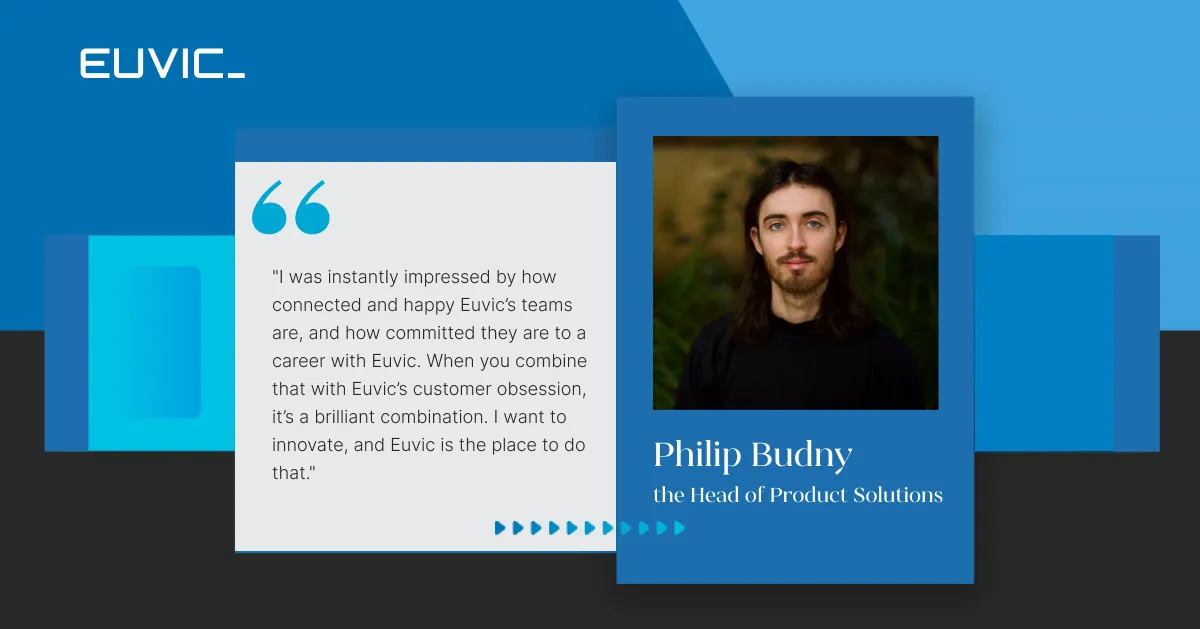The Future of AI in Banking: How Artificial Intelligence Is Shifting The Industry
AI in banking is not a fad—it’s rapidly becoming the backbone of financial innovation.
Global spending on AI in banking was projected to reach $166 billion in 2023, with the banking sector contributing approximately 13% of total AI investment worldwide.
By 2027, this figure is projected to surge to $450 billion, according to the International Data Corporation (IDC).
Even more striking, McKinsey estimates that generative AI alone could add between $200 billion and $340 billion in annual value to the banking sector, representing up to 4.7% of the industry’s total revenues.
From enhancing customer experiences through intelligent chatbots to detecting fraud in real-time and automating complex back-office operations, AI is fundamentally reshaping how banks operate and serve their customers.
At Euvic, we’ve witnessed this transformation firsthand through our work with leading financial institutions.
Our unique combination of U.S.-based leadership and access to over 6,000 skilled Polish engineers positions us at the forefront of the impact of AI in banking
this revolution, helping banks navigate the complex journey of AI implementation while ensuring both innovation and security remain paramount.
In this article, we’ll explore how AI permanently changes the banking industry, examine current and future applications, and discuss what the future holds for financial institutions embracing this technology.
How To Start Using AI in Banking
The transition to AI-powered banking requires demands proven experience and measurable results. At Euvic, we’ve helped multiple banks across Europe and the US modernize their operations through strategic AI implementation.
Our track record speaks through numbers:
- 80% reduction in budgeting and reporting time for Fortis Bank
- 73% decrease in system maintenance hours for Swedbank
- 20% increase in insurance sales for POP Pankki
- 4.5-star App Store rating achieved for banking apps (up from 2.8)
- 3-month implementation timeframe for full digital loan processing systems
Euvic combines U.S.-based leadership with over 6,000 skilled Polish engineers to deliver AI solutions that work. We create specialized teams for each project, matching technical expertise with banking industry knowledge, which has resulted in major wins for our clients:
- Digital Loan Processing: Transformed a major German bank’s paper-based system into a fully digital solution in just three months, enabling remote operations during COVID-19
- Legacy System Modernization: Helped Swedbank migrate critical applications to modern platforms, reducing maintenance time from 150 to 40 hours
- Mobile Banking Innovation: Built POP Pankki’s new AI-enhanced platform, leading to the highest customer satisfaction ratings in Finland’s banking sector
Ready to start using AI in banking? Schedule a consultation with our team to discuss your specific needs and learn how we can help you achieve increased effectiveness with AI.
The Current State of AI in Banking
Banks worldwide implement AI at different speeds, creating new market leaders and laggards. The technology itself has evolved from basic automation to sophisticated systems that can create content and make complex decisions. While applications for AI may overlap between the banking industry and other finance-related industries, such as the fintech industry, there are unique use case opportunities specifically for banks.
The Two Major Waves
Traditional AI: The Foundation The first wave of AI in banking focused primarily on automation and prediction. Banks have successfully implemented machine learning models for:
- Credit risk assessment algorithms
- Market trend predictions
- Customer segmentation
- Basic fraud detection systems
Generative AI: The Game Changer Now, a new wave of AI capabilities is emerging that goes beyond simple automation to generate content and facilitate complex decision-making:
- Advanced conversational AI for customer service
- Automated document analysis and generation
- Code writing for faster development
- Sophisticated financial advisory services
Key Drivers Accelerating Adoption
Several critical factors are driving the banking sector’s embrace of AI:
- Post-Pandemic Digital Imperative: COVID-19 exposed the limitations of paper-based processes and in-person services.
- Rising Customer Expectations: Modern banking customers demand personalized, instant service.
- Efficiency Imperatives: Banks are under pressure to reduce costs while improving service quality.
Early Leaders Setting the Pace
Major financial institutions are already demonstrating the transformative impact of AI:
- JP Morgan has developed sophisticated AI systems for payment validation and fraud reduction
- Bank of America leverages AI for personalized investment recommendations
- Wells Fargo employs advanced conversational AI in its virtual assistant
- Morgan Stanley partners with OpenAI to enhance wealth management services
At Euvic, we’ve found that this transformation is most successful when banks take a strategic, phased approach that balances innovation with security and reliability.
Core Applications of AI in Banking
The most successful banks apply AI across three main areas: customer experience, risk management, and operational efficiency. Here’s how each application area creates value:
Customer Experience Enhancement
Modern banking customers expect 24/7 service and personalized experiences. AI makes this possible through:
AI-Powered Customer Service
- Smart chatbots handle basic inquiries and transactions
- Virtual assistants offer financial guidance
- Natural language processing enables human-like interactions
Personalized Banking
- AI analyzes spending patterns to suggest better financial products
- Custom investment recommendations based on risk profiles
- Proactive alerts about unusual account activity
Risk Management & Security
AI strengthens banks’ defense systems through sophisticated monitoring and analysis:
Fraud Prevention
- Real-time transaction monitoring
- Pattern recognition for suspicious activities
- Behavior-driven analysis to spot unusual account usage
Risk Assessment
- Advanced credit scoring models
- Anti-money laundering detection
- Market risk analysis
- Automated regulatory compliance checks
Operational Efficiency
AI reduces costs and increases speed across banking operations:
Process Automation
- Automated document processing and validation (reducing processing time by up to 80%)
- Smart loan application assessment that flags high-risk applications
- Automated regulatory reporting and compliance checks
- Invoice processing and payment reconciliation
System Integration & Modernization
- Legacy system updates that maintain data integrity
- API integration for seamless third-party services
- Cloud migration for improved scalability
- Data warehouse optimization
- Real-time transaction processing
Challenges and Considerations of Using AI in Banking
While AI offers significant benefits to banks, its implementation brings specific challenges that must be addressed. Here’s what banks need to plan for:
Data Privacy and Security
AI systems process vast amounts of sensitive financial data. This creates new security requirements:
- Protection of customer financial information
- Secure storage and transmission of AI-processed data
- Prevention of AI model manipulation
- Safeguards against unauthorized access
- Security protocols for third-party AI integrations
Regulatory Compliance
Banks face strict regulations around AI use:
- Data protection laws like GDPR
- Banking-specific AI regulations
- Model validation requirements
- Transparency mandates for AI decisions
- Cross-border data handling rules
Ethical Considerations
AI in banking raises important ethical questions:
- Bias in credit decisions
- Fairness in customer service automation
- Transparency in AI-driven recommendations
- Impact on banking jobs
- Social responsibility in AI deployment
Integration Challenges
Implementing AI within existing bank infrastructure presents technical hurdles:
- Connecting AI systems with legacy platforms
- Maintaining system stability during integration
- Data quality and standardization
- Performance optimization
- Scalability requirements
Talent and Training
Banks need specialized skills to implement AI:
- AI/ML engineers and data scientists
- Banking technology specialists
- Security experts
- Change management professionals
- Ongoing staff training programs
Our experience at Euvic shows these challenges are manageable with the right approach. For example, when implementing AI loan processing for a major German bank, we addressed security concerns through strict protocols while meeting tight regulatory requirements. Similarly, POP Pankki’s successful mobile banking platform demonstrates how proper planning can overcome integration challenges while maintaining high-security standards.
How To Successfully Implement AI in Banking
Banks that successfully implement AI follow clear strategies that prioritize results over complexity. Here’s what works:
Operating Model Selection
The most effective AI implementations start with a clear operating model:
- Centralized AI teams for consistent standards
- Clear governance structures
- Defined roles between IT and business units
- Measurable success metrics
Build vs. Buy Decisions
Smart AI implementation requires strategic choices about technology:
- Use existing solutions for common functions
- Build custom applications for competitive advantage
- Mix internal development with vendor solutions
- Focus on integration capabilities
Infrastructure Requirements
Proper infrastructure forms the foundation of AI success:
- Cloud-based platforms for scalability
- Data storage and processing capabilities
- Security architecture
- Integration frameworks
- Performance monitoring systems
Real Applications of AI in Banking: Euvic’s AI Success Stories
Our work with leading financial institutions demonstrates the practical impact of AI in banking. Here are three transformative projects:
German Bank: Digital Loan Processing
A leading credit and mortgage institution with €14 billion in assets faced a critical challenge during COVID-19: their paper-based loan processing system couldn’t support remote work.
The Challenge:
- Manual, paper-based workflows slowed operations
- Remote work limitations threatened business continuity
- Multiple user types needed different access levels
- High regulatory compliance requirements
- Urgent need for digital transformation
Our Solution:
- UX/UI designers created intuitive interfaces
- Front-end and back-end engineers built the core system
- Business analysts mapped processes
- Project managers maintained tight timelines
- QA testers ensured reliability
Results Achieved:
- Complete system deployment in 3 months
- Full regulatory compliance maintained
- Seamless integration with existing IT systems
- Significant reduction in loan processing time
- Long-term efficiency gains beyond COVID-19
Financial Control Transformation: Fortis Bank
The Challenge:
- Inefficient budget management
- Multiple file versions caused confusion
- Limited data control and visibility
- High administrative costs
- Time-consuming manual processes
Our Solution:
- Microsoft SQL Server with analytical services
- Excel-based user interface for familiarity
- Centralized data storage system
- Active Directory integration for security
- PivotTable reporting capabilities
Results Achieved:
- 80% reduction in reporting and budgeting time
- Improved financial control
- Centralized data management
- Reduced workload for staff
- Scalable foundation for future growth
Legacy System Modernization: Swedbank
The Challenge:
- Critical applications running on outdated technology
- 626,000 lines of code needed migration
- Limited internal resources
- High-security requirements
- Business continuity demands
Our Solution:
- Project manager
- Four developers
- Dedicated tester
- Used Scrum framework
- Implemented strict security protocols
Results Achieved:
- Successful migration to Visual Basic .Net
- Maintenance time cut from 150 to 40 hours
- Enhanced operational efficiency
- Improved system security
- Future-ready technology foundation
The Future of AI in Banking: Partner with Euvic
AI in banking isn’t just about technology—it’s about transformation. As we’ve shown through our case studies and industry analysis, banks that implement AI strategically gain significant competitive advantages.
Key Trends Shaping Banking’s Future
- Generative AI will revolutionize customer service and back-office operations
- Traditional banking processes will become fully digital
- Personalization will reach new levels of sophistication
- AI security measures will become standard practice
- Banks will need stronger technical partnerships to compete
Why Partner with Euvic for Your AI Banking Goals
Our track record speaks through numbers:
- 6,000+ skilled engineers ready to tackle complex banking projects
- 100+ specialized teams with deep fintech expertise
- Top 5 ranking in global engineering competitions
- 92% employee retention rate ensuring project continuity
- 31% year-over-year growth showing consistent success
Real Results for Banks
Our banking implementations consistently deliver:
- 3-month implementation timeframes for major systems
- 80% reduction in processing time (Fortis Bank)
- 73% decrease in system maintenance (Swedbank)
- 20% increase in sales (POP Pankki mobile platform)
- Highest customer satisfaction ratings (Finland banking sector)
Start Your AI Banking Transformation
With US-based leadership and world-class Polish engineering talent, Euvic offers:
- End-to-end AI implementation services
- Custom solutions for specific banking needs
- Proven experience with major financial institutions
- Strategic guidance throughout the AI journey
- Measurable results and ROI
Do you want proven IT and software experts to create an AI implementation roadmap for your bank?
The future of banking is AI-driven, and the time to act is now. Whether you’re looking to enhance customer engagement, streamline operations, or build AI-powered solutions from the ground up, Euvic has the expertise to deliver measurable results.
Schedule a consultation with our banking technology experts at Euvic. We’ll analyze your specific needs and show you how our experience with Swedbank, Fortis Bank, and other leading institutions can benefit your organization.
Euvic is a competitive advantage for us. The technical excellence that Euvic has brought is not easily matched and their support has become integral to our growth strategy.

Euvic is a competitive advantage for us. The technical excellence that Euvic has brought is not easily matched and their support has become integral to our growth strategy.

Euvic is a competitive advantage for us. The technical excellence that Euvic has brought is not easily matched and their support has become integral to our growth strategy.

Talk to Your Local Euvic Team

















.webp)







































































